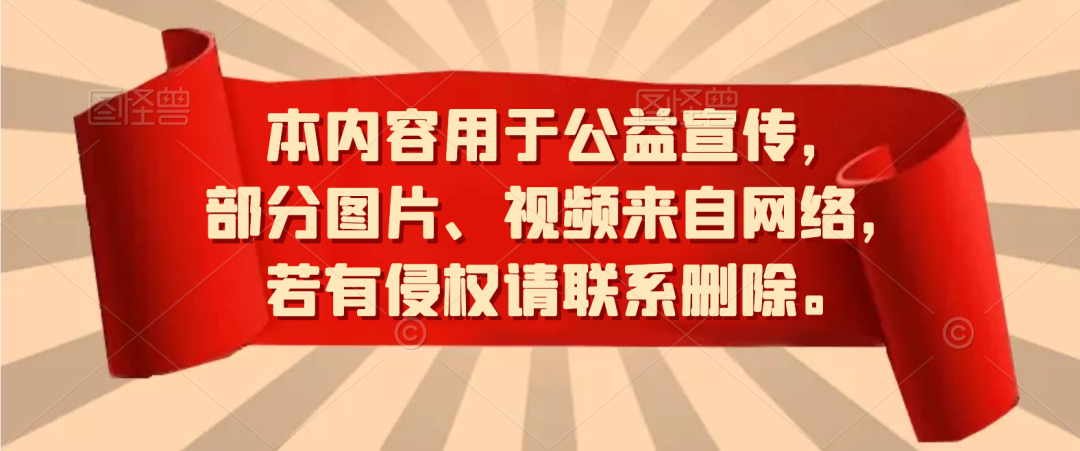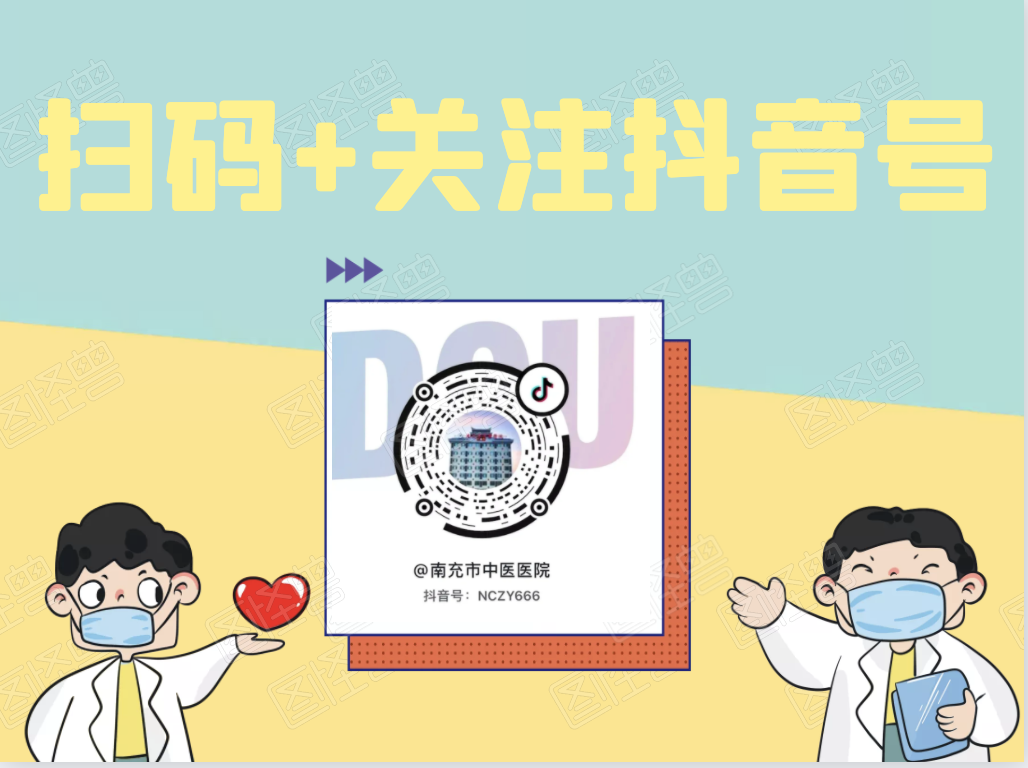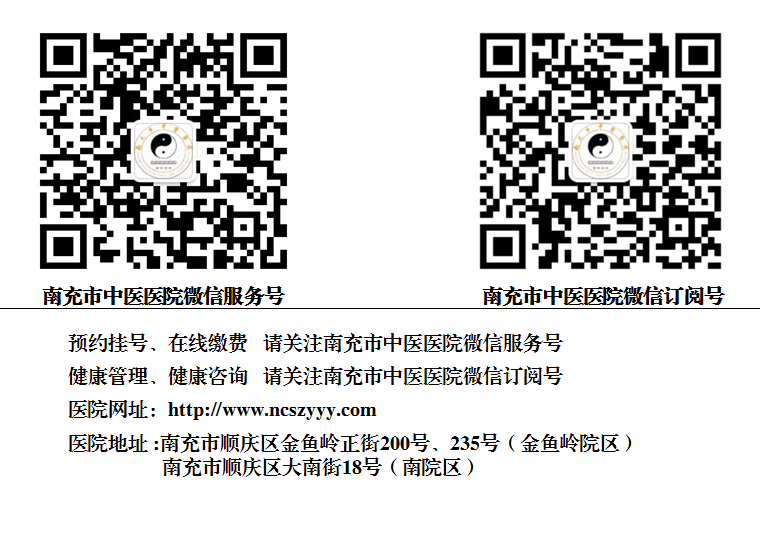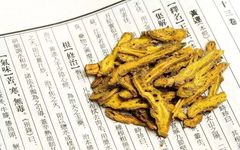
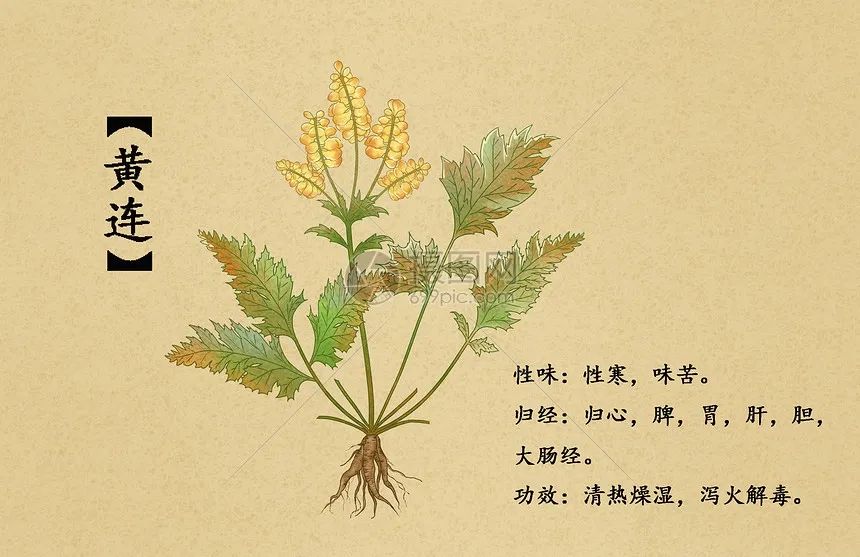
Huang Lian (Coptis chinensis)
By Wu Kuan, Ming Dynasty
Flowers delicate like mountain cinnamon, unbearable to smell at the steps.
The wild man’s root, long and segmented, should be nine.
The bitter segment cannot be pure, but consuming it can prolong life.
Its efficacy for diseases, some guests dislike its bitter taste.
Beware not to plant this, its taste is bitter and hard to endure.
Is it not seen that Gan Cao (Licorice), has all medicines?
1. Historical References in Materia Medica
Legend has it that in ancient times, there was an old doctor who had a medicinal garden,
and employed a diligent boy named Huang Lian to help manage the herbs.
In his free time, Huang Lian went to the mountains and discovered a lovely little grass
with leaves resembling sweet chrysanthemum and small yellow flowers,
so he uprooted it and planted it in the medicinal garden.
One day, the old doctor’s daughter was feverish, vomiting, and had diarrhea,
talking nonsense in a daze, and her condition did not improve with medication.
Huang Lian remembered his own sore throat,
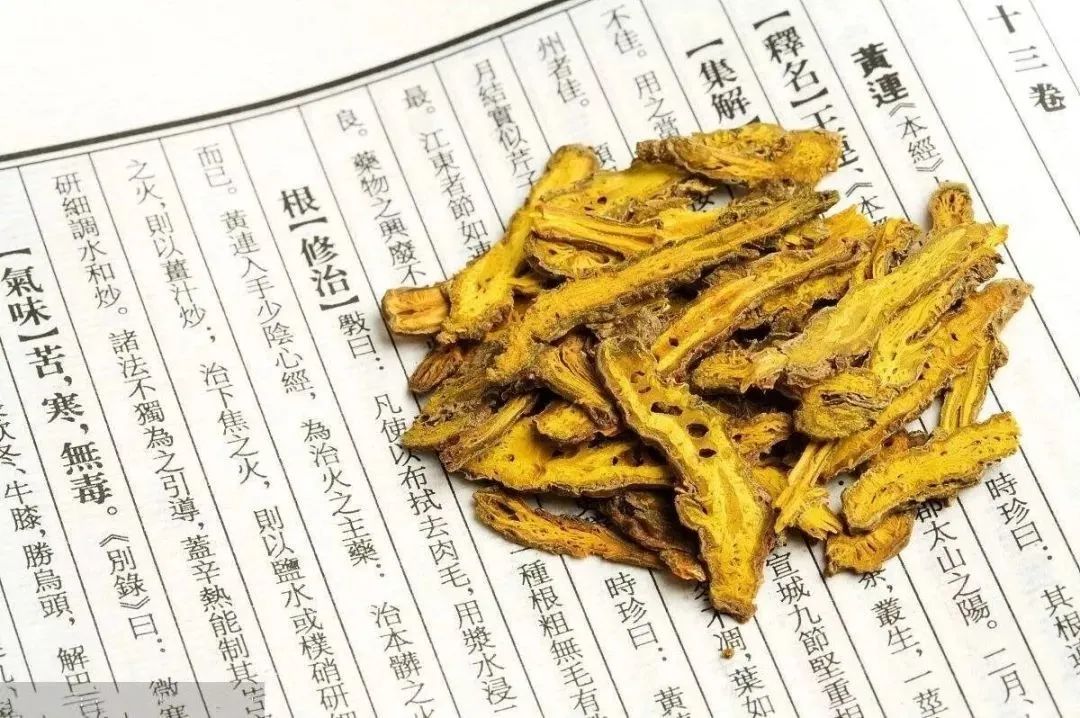
he had once chewed the leaves of the little grass,
though bitter, it made his throat feel cool and comfortable,
after a few days of chewing, his sore throat was completely healed.
He then recommended it to the doctor, who brewed a decoction for his daughter,
and after three days, she was miraculously cured.
Since this medicine was discovered and cultivated by Huang Lian,
the doctor named it “Huang Lian”.
2. Materia Medica Examination
Huang Lian was first recorded in the Eastern Han Dynasty’s Shen Nong Ben Cao Jing: it is bitter and cold. It treats heat, eye pain, tears, brightens vision, intestinal dysentery, abdominal pain, diarrhea, and swelling pain in women’s private parts. Long-term use prevents forgetfulness. The Ben Cao states: it treats heat, eye pain, tears, brightens vision, intestinal dysentery, abdominal pain, diarrhea, and swelling pain in women’s private parts. It regulates the five organs’ heat and cold, stops prolonged diarrhea with pus and blood, alleviates thirst and fright, removes water, benefits bones, regulates the stomach and thickens the intestines, benefits the gallbladder, and heals mouth sores. Long-term use prevents forgetfulness.
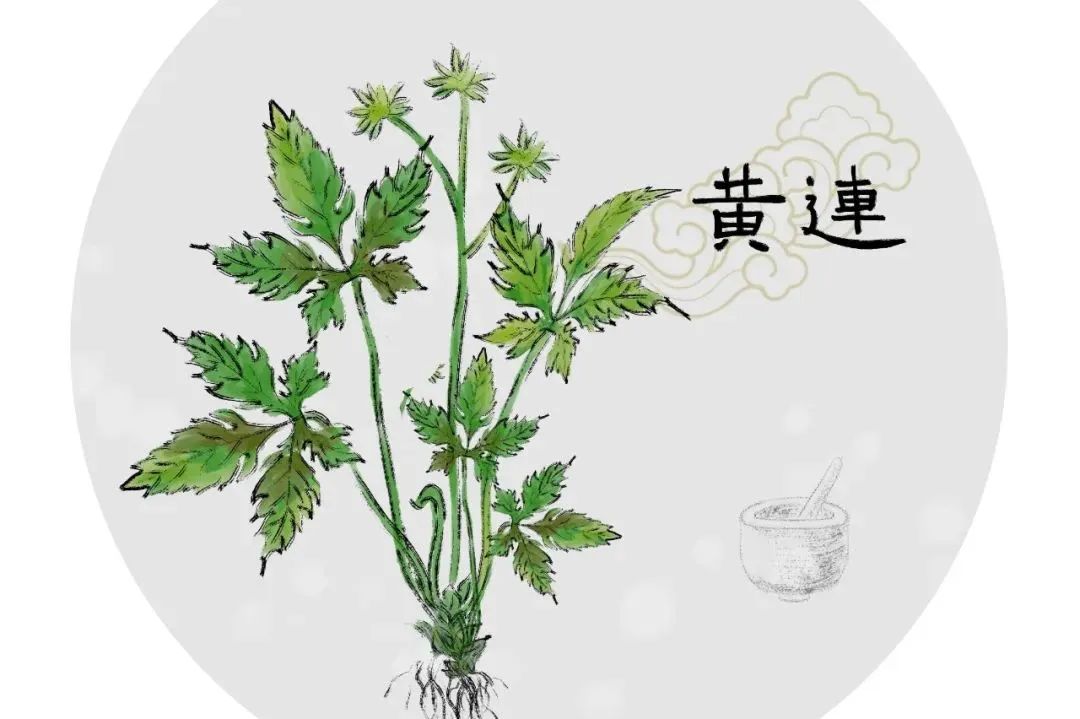
The Ben Cao Jing Shu: Huang Lian absorbs the clear and cold qi of heaven and earth, hence its bitter and cold taste and non-toxic nature. Its taste is thicker than its qi, bitter and thick, which is yin. It is suitable for downward movement, but to make it ascend, it needs guidance. It enters the hand’s Shaoyin, Yangming, foot’s Shaoyang, Jueyin, foot’s Yangming, and Taiyin channels. It is a miraculous herb for alcohol-related diseases and a divine herb for stagnation. Each of the six channels has its unique efficacy. It treats heat, eye pain, tears, brightens vision, fright, and benefits the gallbladder, cooling the heart and clearing the liver and gallbladder. It treats intestinal dysentery, abdominal pain, and diarrhea.
3. Traditional Chinese Medicine Huang Lian
Huang Lian (Scientific name: Coptis chinensis Franch.), is commonly said that “a mute eats Huang Lian, has bitterness but cannot speak”, referring to its extremely bitter taste.
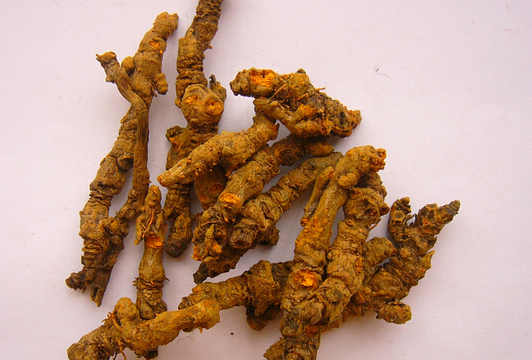
【Source】Dry rhizomes of the Ranunculaceae plant Huang Lian (Coptis chinensis Franch.), Triangular-leaved Huang Lian (Coptis deltoidea C.Y.Cheng et Hsiao), or Yun Lian (Coptis teeta Wall.). These three are commonly referred to as “Wei Lian”, “Ya Lian”, and “Yun Lian”. Harvested in autumn, the fibrous roots and soil are removed, dried, and residual fibrous roots are knocked off.
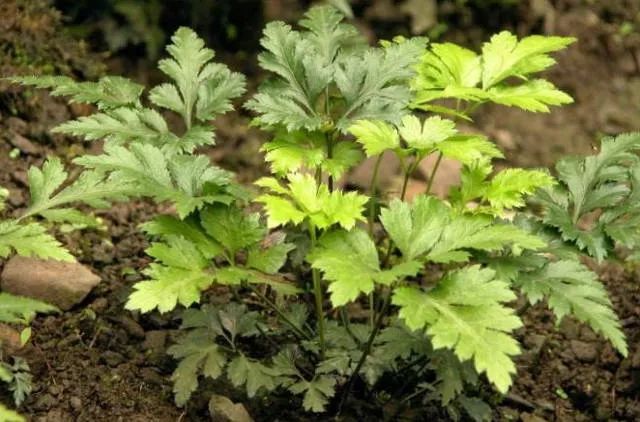
【Properties and Taste】It is bitter and cold.
【Meridian Entry】Enters the Heart, Spleen, Stomach, Liver, Gallbladder, and Large Intestine meridians.
【Efficacy】Clears heat and dries dampness, drains fire and detoxifies. Used for damp-heat fullness, vomiting, acid regurgitation, diarrhea, jaundice, high fever with delirium, excessive heart fire, irritability and insomnia, palpitations, blood heat with vomiting and nosebleeds, red eyes, toothache, diabetes, and carbuncles; externally treats eczema, wet sores, and ear discharge.
Alcohol Huang Lian effectively clears heat from the upper jiao, used for red eyes and mouth sores. Ginger Huang Lian harmonizes the stomach and stops vomiting, used for cold-heat counterflow, damp-heat obstruction, fullness, and vomiting. Yu Huang Lian soothes the liver and harmonizes the stomach to stop vomiting, used for liver-stomach disharmony, vomiting, and acid regurgitation.
【Contraindications】This product is extremely bitter and cold, long-term use can harm the spleen and stomach, contraindicated for those with spleen and stomach deficiency and cold. Bitter and dry can injure fluids, caution for those with yin deficiency and fluid injury.
4. Pharmacological Effects
Huang Lian is a perennial herb of the Ranunculaceae family, its chemical components mainly include alkaloids, lignans, flavonoids, and acidic components.
Modern pharmacological studies show that Huang Lian has high medicinal value, with protective effects on cardiovascular and cerebrovascular systems, blood sugar reduction, anti-inflammatory, and anti-tumor effects.
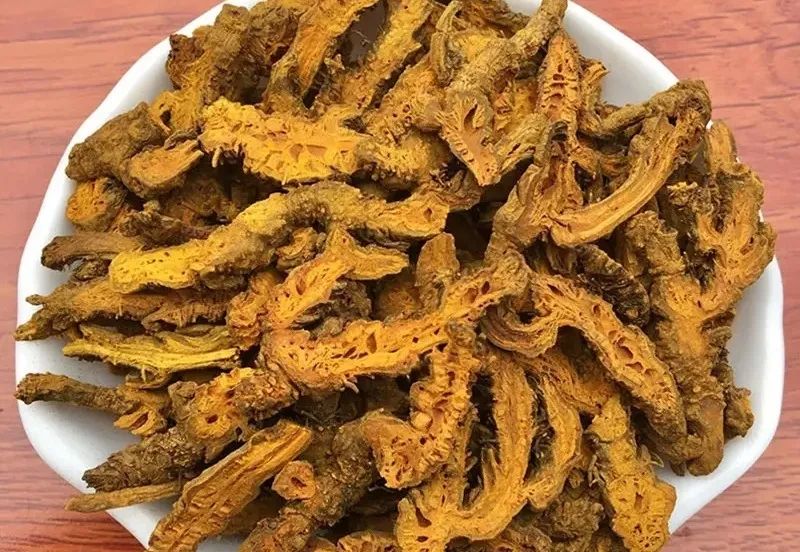
1) Anti-tumor
The berberine contained in Huang Lian has anti-cancer effects, its molecular mechanisms include: blocking the cell cycle, inhibiting the activity of related proteases, regulating signaling pathways, downregulating oncogene expression, lowering IL-6 levels, inducing mitochondrial membrane potential, and blocking potassium ion channels.
2) Anti-inflammatory
In related clinical studies, children with early viral enteritis showed significant improvement in clinical symptoms such as diarrhea, abdominal pain, and fever after treatment with Huang Lian oral liquid, shortening treatment time and greatly alleviating suffering. Studies show that the in vitro anti-inflammatory activity was compared between Huang Lian ethanol extract and berberine hydrochloride, with the former showing stronger anti-inflammatory efficacy, indicating that Huang Lian’s pharmacological effects are not solely due to berberine.
3) Antioxidant
Research shows that Huang Lian exhibits antioxidant activity, with extracts of polysaccharides, polyphenols, total alkaloids, and hydrophilic components showing significant antioxidant activity, mainly attributed to flavonoids.
4) Diabetes Blood Sugar Reduction
Clinical application results show that the berberine component in Huang Lian can effectively control blood sugar levels in patients, and has significant effects on lowering blood pressure and improving kidney function. Studies indicate that berberine treatment for diabetes with hypertension shows significant advantages, with high tolerance, minimal side effects, and high safety, thus enhancing treatment efficacy and reducing the occurrence of related complications.
5. Identification of Huang Lian
Huang Lian slices: Remove impurities, soak until permeable, cut into thin slices, dry, or crush when needed.
【Characteristics】: This product appears as irregular thin slices. The outer skin is grayish-yellow or yellow-brown, rough, with small fibrous roots. The cut surface or broken surface is bright yellow or reddish-yellow, with radial texture.
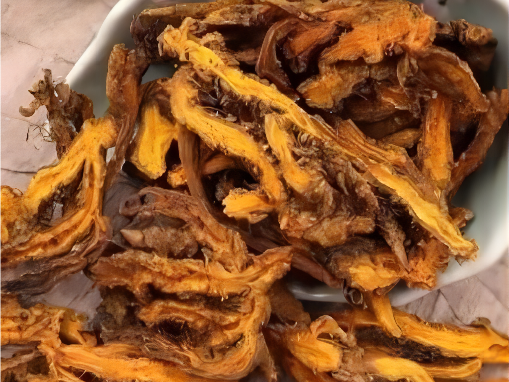
Alcohol Huang Lian:Take clean Huang Lian, fry dry according to the alcohol roasting method. For every 100 kg of Huang Lian, use 12.5 kg of yellow wine.
【Characteristics】: This product resembles Huang Lian slices, with a deeper color and a slight wine aroma.
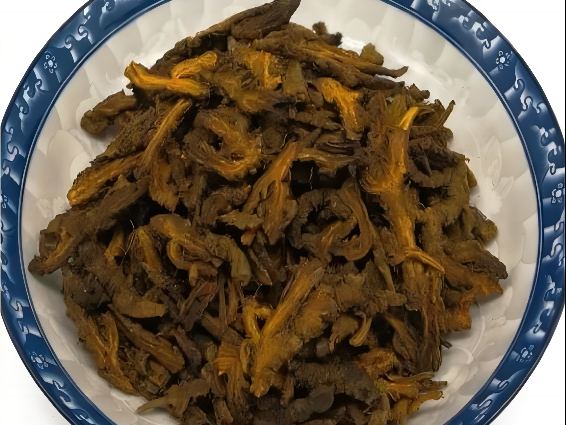
Ginger Huang Lian:Take clean Huang Lian, fry dry according to the ginger juice roasting method. For every 100 kg of Huang Lian, use 12.5 kg of fresh ginger.
【Characteristics】: This product resembles Huang Lian slices, with a deep brownish-yellow surface and a spicy ginger flavor.
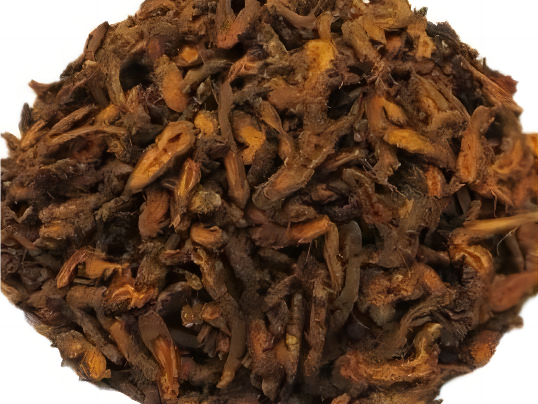
Yu Huang Lian:Take Wu Zhu Yu and an appropriate amount of water to decoct, mix the decoction with clean Huang Lian, and dry after the liquid is absorbed. For every 100 kg of Huang Lian, use 10 kg of Wu Zhu Yu.
【Characteristics】: This product resembles Huang Lian slices, with a brownish-yellow surface and a spicy aroma of Wu Zhu Yu.
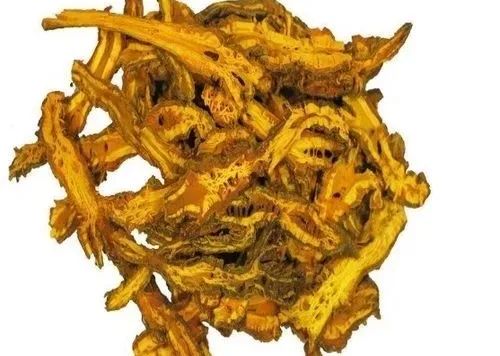
Warm Reminder
Huang Lian is extremely bitter and cold, long-term use can harm the spleen and stomach, contraindicated for those with spleen and stomach deficiency. Bitter and dry can injure fluids, caution for those with yin deficiency and fluid injury.
Contributed by: Pharmacy Department
Reviewed by: Deng Yuquan, Kong Yan
Nanchong Traditional Chinese Medicine Hospital New Media Studio
